Are you searching for the best DeBank API alternative? If so, look no further! In this guide, we introduce you to Moralis, the top Web3 data provider in the industry. With our comprehensive DeFi API, you can easily retrieve liquidity provider tokens, cross-chain liquidity data, DeFi positions, and much more with just a few lines of code. This allows you to streamline your development efforts without breaking a sweat!
If you’re eager to jump straight into it, here’s an example showing you how to easily get the DeFi positions of any wallet:
import fetch from 'node-fetch';
const options = {
method: 'GET',
headers: {
accept: 'application/json',
'X-API-Key': 'YOUR_API_KEY'
},
};
fetch('https://deep-index.moralis.io/api/v2.2/wallets/0xcB1C1FdE09f811B294172696404e88E658659905/defi/positions?chain=eth', options)
.then(response => response.json())
.then(response => console.log(response))
.catch(err => console.error(err));
In return for calling the endpoint above, you’ll get the DeFi positions of the specified wallet. Here’s an example of what it might look like:
[
{
"protocol_name": "Uniswap v2",
"protocol_id": "uniswap-v2",
"protocol_url": "https://app.uniswap.org/pools/v2",
"protocol_logo": "https://cdn.moralis.io/defi/uniswap.png",
"position": {
"label": "liquidity",
"tokens": [
{
"token_type": "supplied",
"name": "USD Coin",
"symbol": "USDC",
"contract_address": "0xa0b86991c6218b36c1d19d4a2e9eb0ce3606eb48",
"decimals": "6",
"logo": "https://logo.moralis.io/0x1_0xa0b86991c6218b36c1d19d4a2e9eb0ce3606eb48_e6ec22e3ef954a7f9eda04f294938f4d",
"thumbnail": "https://logo.moralis.io/0x1_0xa0b86991c6218b36c1d19d4a2e9eb0ce3606eb48_e6ec22e3ef954a7f9eda04f294938f4d",
"balance": "10201154.21838458636254664856",
"balance_formatted": "10.20115421838458636254664856",
"usd_price": 1.0005100883196762,
"usd_value": 10.206357707998599
},
//...
],
"address": "0xb4e16d0168e52d35cacd2c6185b44281ec28c9dc",
"balance_usd": 20.39728835741469,
"total_unclaimed_usd_value": null,
"position_details": {
"reserve0": "10.20115421838458636254664856",
"reserve1": "0.00330867451530769526077552762624109457",
"factory": "0x5c69bee701ef814a2b6a3edd4b1652cb9cc5aa6f",
"pair": "0xb4e16d0168e52d35cacd2c6185b44281ec28c9dc",
"share_of_pool": 0.000020959018625703
}
}
},
//...
]
As you can see, fetching the DeFi positions of a wallet is straightforward with Moralis!
For a deeper dive into why Moralis is the best DeBank API alternative, continue reading this guide or watch our detailed Moralis YouTube video here:
Also, if you want to start using the best DeBank API alternative immediately, take this opportunity to sign up with Moralis. You can create your account free of charge, and you’ll gain immediate access to our comprehensive suite of industry-leading APIs!
Overview
If you’re looking to build a DeFi dapp and want to track DeFi positions, you might have come across the DeBank API. But while DeBank offers a range of tools, it’s not the optimal choice for DeFi developers. That’s why we’re introducing you to Moralis, the industry’s leading Web3 infrastructure provider.

Similar to DeBank, Moralis offers a robust suite of APIs. However, our APIs provide the industry’s most comprehensive responses, unparalleled scalability, enterprise-grade data security, and much more, all available for free. Are you interested in learning more? Join us in this guide as we explore Moralis and explain why it stands out as the premier choice among the best DeFi solutions!
What is a DeFi API?
A DeFi API (application programming interface) is a collection of rules, protocols, and methods that enable seamless interaction with blockchain networks and decentralized applications (dapps), allowing for the effortless integration of DeFi data into your Web3 projects.
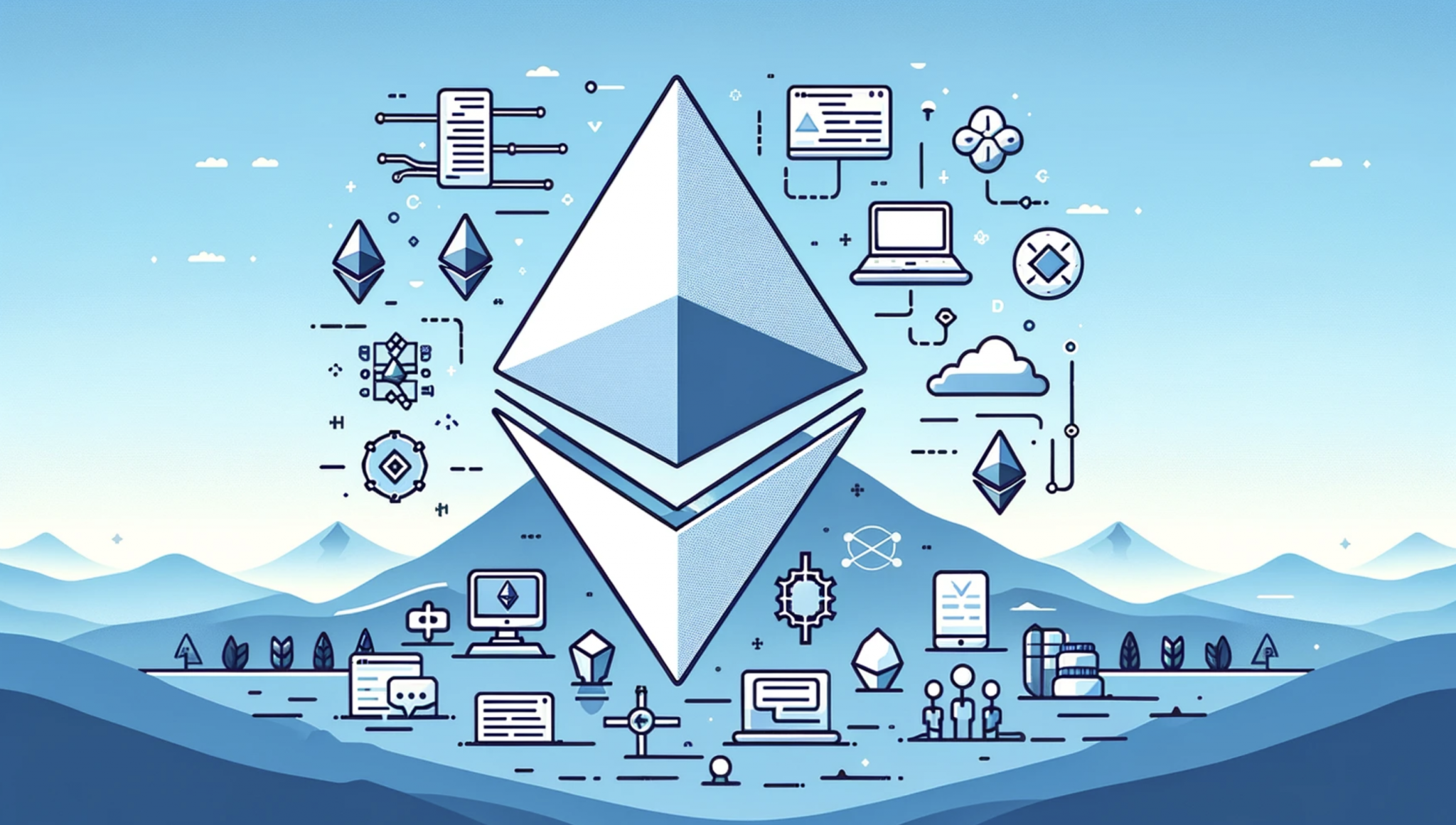
With top-tier DeFi APIs, you can easily access cross-chain liquidity data, real-time prices, DeFi positions, token approvals, wallet information, and much more. Utilizing these pre-built protocols and methods allows you to efficiently incorporate the data you need into your DeFi dapps with minimal effort.
But what can you build using a DeFi API?
- Trading Platforms: These online marketplaces allow users to buy, sell, and swap cryptocurrencies. They come in two main types: centralized exchanges (CEXs) and decentralized exchanges (DEXs).
- DeFi & Token Analytics: These platforms provide users with in-depth insights into the market, tokens, and trends. They often feature enriched token pages, top lists, explorers, and more.
- Staking & Lending: Staking and lending protocols enable users to stake and lend cryptocurrencies, typically earning rewards and interest on their locked assets in return.
In summary, a DeFi API is a set of protocols, rules, and methods that streamline the development of DeFi platforms, including trading, analytics, and staking or lending dapps. By using a DeFi API, you significantly save time and resources in your development efforts.
What is the DeBank API?
The DeBank API is a suite of programming interfaces provided by DeBank, a DeFi portfolio tracker and analytics platform. This API allows developers to access various data points and DeFi functionalities, enabling seamless integration into their own applications or services.

The DeBank API suite consists of five core interfaces:
- User API: Used to fetch a user’s token balances, transaction history, DeFi positions, and more.
- Token API: Provides information on top token holders, token details, and prices.
- Wallet API: Used to retrieve gas prices, transaction pre-executions, and transaction data.
- Protocol API: Offers details on protocols, including top holders and general information.
- Chain API: Allows developers to query chain information and supported networks.
However, despite its capabilities, the DeBank API isn’t the best choice for developing DeFi dapps. For a more robust solution, we recommend considering the industry-leading DeBank API alternative: Moralis!
Exploring Moralis – The Leading DeBank API Alternative
Moralis is the leading provider of Web3 infrastructure and data in the industry. Our extensive suite of Web3 APIs features over ten specialized interfaces for integrating data seamlessly into your dapps. As such, with Moralis, you can easily build everything from DeFi platforms to cryptocurrency wallets with minimal effort!
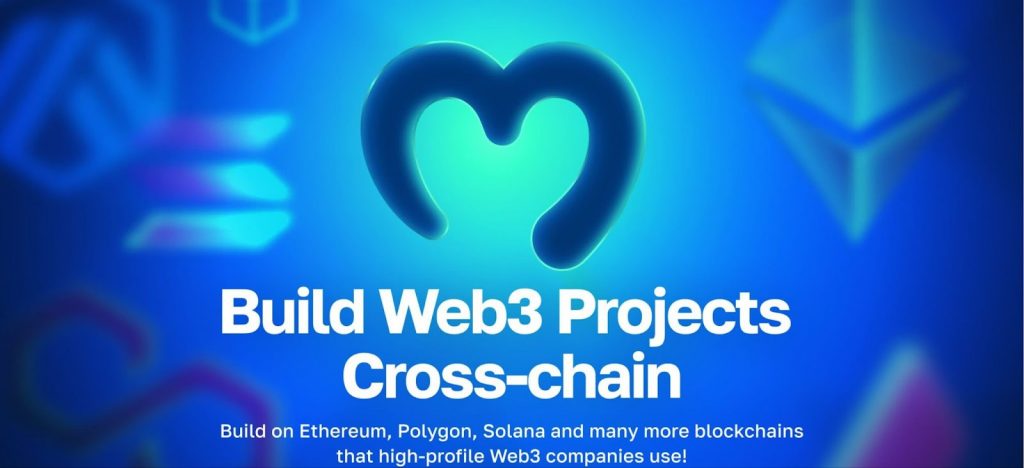
Compared to the DeBank API suite, which includes only five core interfaces, Moralis offers more than ten industry-leading APIs. Here are five notable examples:
- DeFi API: Access DeFi positions, cross-chain liquidity data, token allowances, and more with ease.
- Wallet API: Retrieve comprehensive wallet data, including any address’ transaction history, net worth, balances, profitability, and more, through single API calls.
- Token API: Effortlessly fetch token balances, metadata, prices, and additional information.
- NFT API: Obtain NFT data, including balances, up-to-date metadata, prices, and more.
- Streams API: Set up Web3 data pipelines to stream data directly into your project’s backend as soon as significant on-chain events occur.
- …and there’s even more to explore!
For detailed information about all our interfaces, visit our official Web3 API page.
What Makes Moralis the Best DeBank API Alternative?
Now that we have an overview of Moralis’ Web3 API suite, let’s explore the key benefits of building with Moralis:
- Comprehensive: Our API responses are designed with the outcome in mind, reducing the number of calls needed to create sophisticated dapps. By leveraging Moralis, you can streamline your workflow, enabling you to build platforms faster and more efficiently.
- Cross-Chain: Moralis’ APIs provide full feature parity across all major blockchains, including Ethereum, Polygon, BNB Smart Chain (BSC), Optimism, and many more.
- Secure: Moralis is the only SOC 2 Type 2 certified Web3 infrastructure provider. As such, if enterprise-grade data security is a priority for you, Moralis is the optimal choice.
That gives you some key reasons as to why you should build your dapps with Moralis. In the next section, we’ll highlight these advantages further by comparing Moralis to the DeBank API!
Moralis Vs. DeBank API
Here’s a summary of why Moralis stands out as a better alternative compared to the DeBank API:
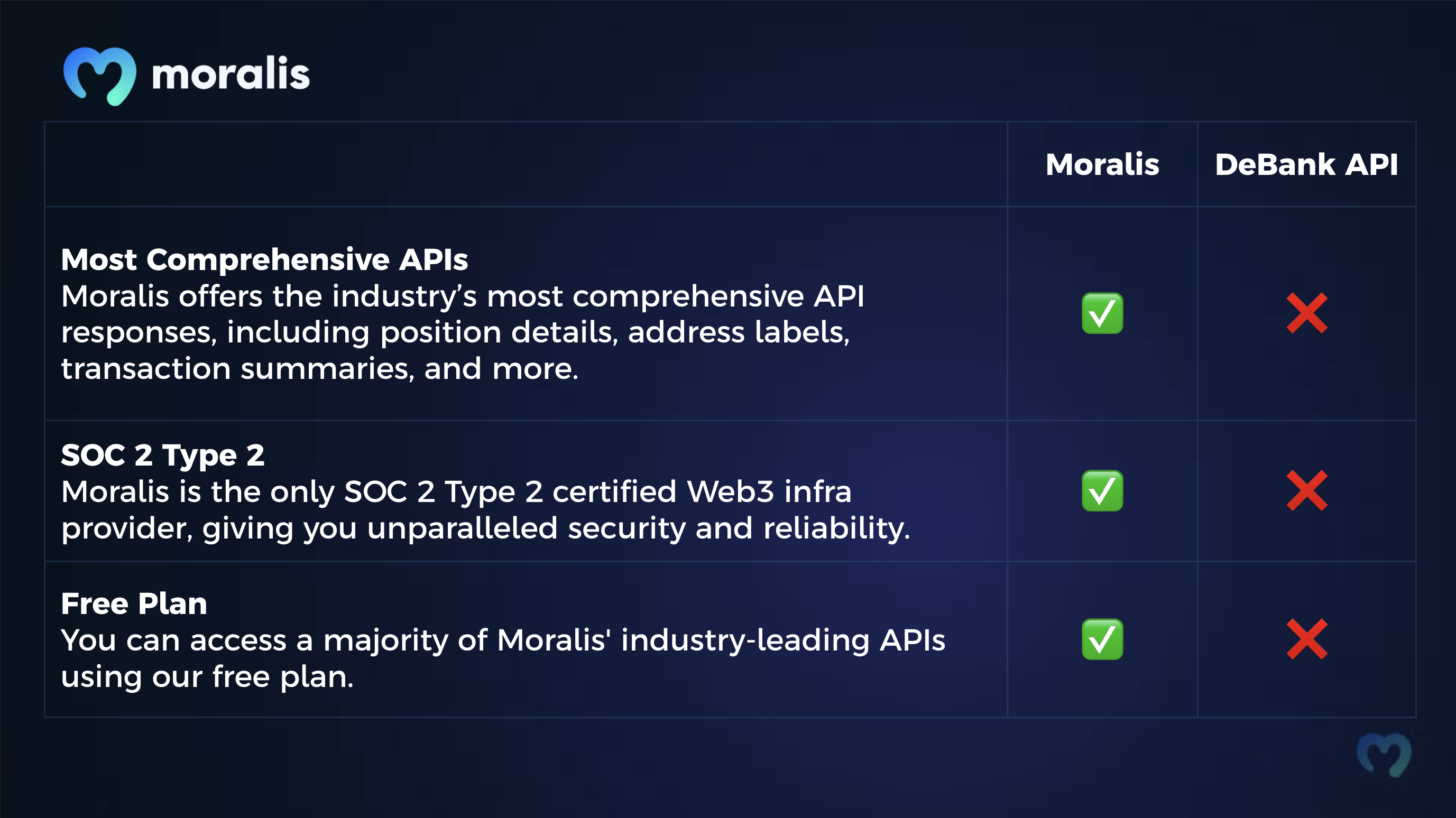
Let’s elaborate on this a bit further:
- Comprehensive Responses: Moralis’ APIs deliver the most comprehensive responses in the industry. As such, with Moralis, you receive all the data you need through a single API call. To illustrate the differences, here’s a side-by-side comparison of the wallet history endpoints from Moralis and the DeBank API:

Moralis provides an enriched response containing valuable human-readable data, such as automatic category tags, address labels, transaction summaries, and more. And while we’re using the Wallet History endpoint as an example, this level of detail is consistent across all Moralis endpoints.
- Security Certification: Moralis is SOC 2 Type 2 certified, ensuring top-notch data security. DeBank API doesn’t offer the same reassurances, making Moralis the clear choice if data security is a priority.
- Free Plan: Moralis offers a free plan that grants access to most of our APIs. In contrast, to use the DeBank API, you need to buy compute units, with one million units priced at $200 at the time of writing.
In conclusion, if you’re looking for the best, safest, and most cost-effective API solution, Moralis is the way to go!
Exploring Moralis’ DeFi API – The Easiest Way to Get DeFi Positions
Moralis’ DeFi API is the ultimate tool for building DeFi dapps. With this premier interface, you can seamlessly obtain liquidity pairs, ERC20 allowances, DeFi positions, and much more using only single API calls!
Let’s highlight some of our prominent features by exploring our DeFi position endpoints:
- Summary of DeFi Protocols by Wallet: Fetch a summary of all protocols a wallet interacts with, including unclaimed rewards and total USD value:
import fetch from 'node-fetch';
const options = {
method: 'GET',
headers: {
accept: 'application/json',
'X-API-Key': 'YOUR_API_KEY'
},
};
fetch('https://deep-index.moralis.io/api/v2.2/wallets/0xcB1C1FdE09f811B294172696404e88E658659905/defi/summary?chain=eth', options)
.then(response => response.json())
.then(response => console.log(response))
.catch(err => console.error(err));
- Summary of DeFi Positions by Wallet: Obtain a standardized summary of all protocol positions for a wallet:
import fetch from 'node-fetch';
const options = {
method: 'GET',
headers: {
accept: 'application/json',
'X-API-Key': 'YOUR_API_KEY'
},
};
fetch('https://deep-index.moralis.io/api/v2.2/wallets/0xcB1C1FdE09f811B294172696404e88E658659905/defi/positions?chain=eth', options)
.then(response => response.json())
.then(response => console.log(response))
.catch(err => console.error(err));
- Detailed DeFi Positions by Wallet and Protocol: Access in-depth information on positions for a specific wallet and protocol:
import fetch from 'node-fetch';
const options = {
method: 'GET',
headers: {
accept: 'application/json',
'X-API-Key': 'YOUR_API_KEY'
},
};
fetch('https://deep-index.moralis.io/api/v2.2/wallets/0xcB1C1FdE09f811B294172696404e88E658659905/defi/uniswap-v3/positions?chain=eth', options)
.then(response => response.json())
.then(response => console.log(response))
.catch(err => console.error(err));
To see how this works in practice, we’ll demonstrate how to effortlessly retrieve the DeFi positions of any wallet in three simple steps!
3-Step Tutorial: How to Get the DeFi Positions of a Wallet
For this tutorial, we’ll show you how to get the DeFi positions of a wallet in three simple steps:
- Get a Moralis API Key
- Create a Script Calling the DeFi Positions by Wallet Endpoint
- Run the Code
However, before we can proceed, you need to take care of a couple of prerequisites!
Prerequisites
For this tutorial, we’ll be using Node.js and JavaScript. As such, before you move on, make sure you have the following ready:
Step 1: Get a Moralis API Key
If you haven’t already, make sure to sign up with Moralis by clicking the “Start for Free” button at the top:
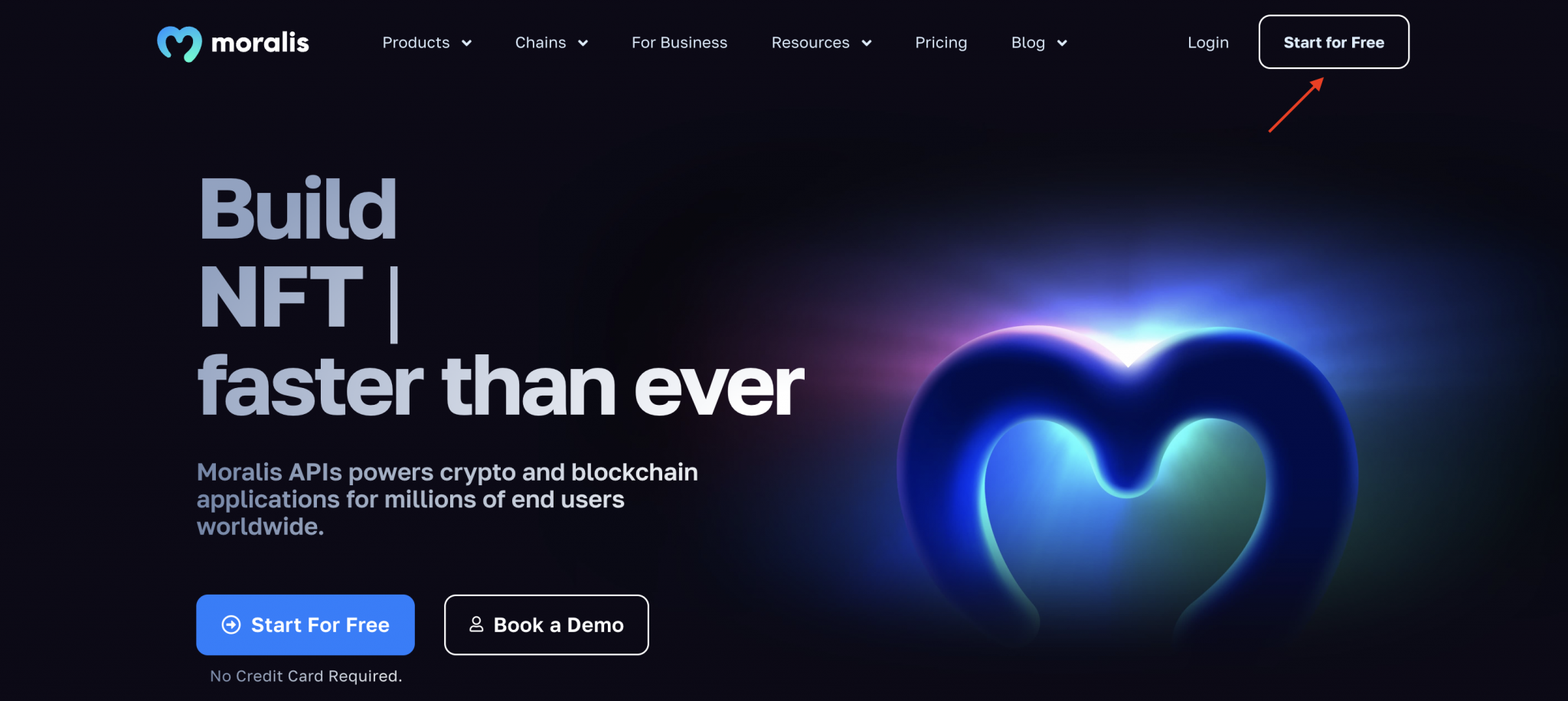
From here, you’ll find your API key directly under the “Home” tab:
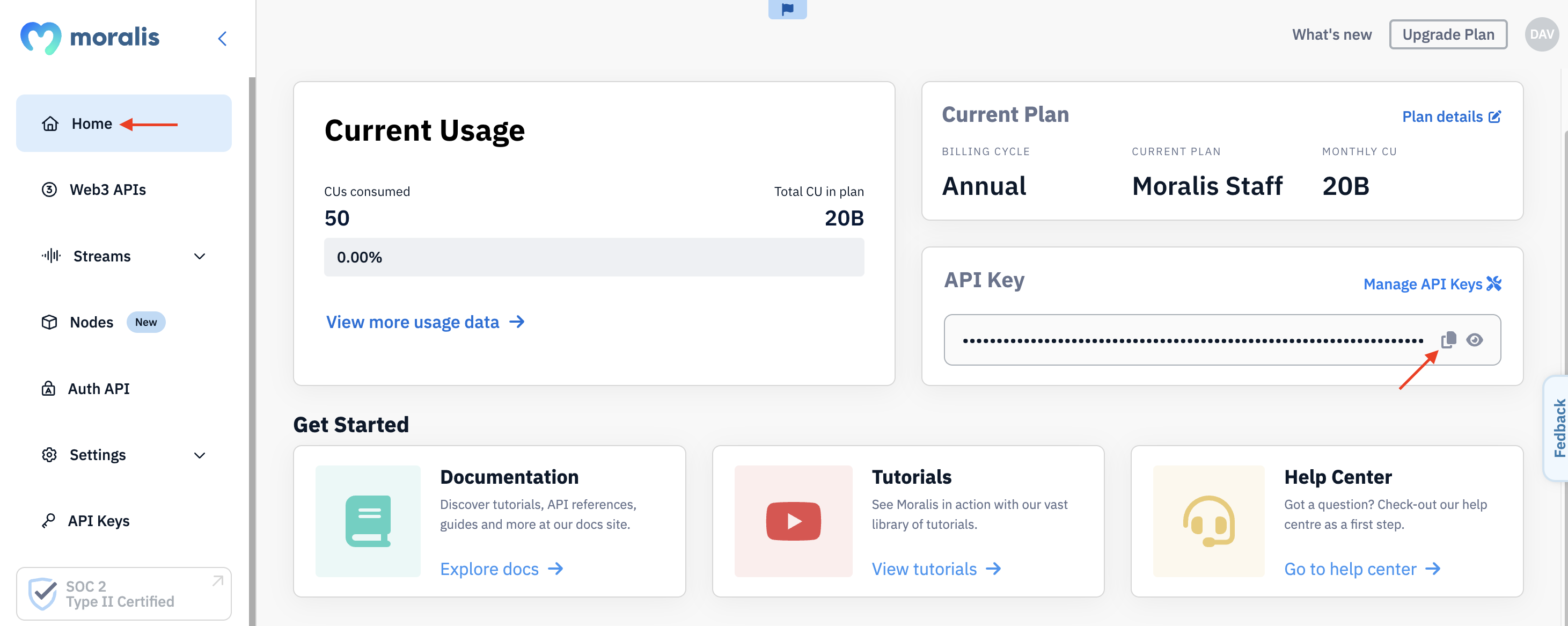
Copy the key and keep it for now, as you’ll need it in the next step!
Step 2: Create a Script Calling the DeFi Positions by Wallet Endpoint
Open your IDE, set up a folder, launch a new terminal, and initialize a project with the following command:
npm init
Next, install the required dependencies:
npm install node-fetch --save npm install moralis @moralisweb3/common-evm-utils
From here, set up a new “index.js” file and add the following code:
import fetch from 'node-fetch';
const options = {
method: 'GET',
headers: {
accept: 'application/json',
'X-API-Key': 'YOUR_API_KEY'
},
};
fetch('https://deep-index.moralis.io/api/v2.2/wallets/0xcB1C1FdE09f811B294172696404e88E658659905/defi/positions?chain=eth', options)
.then(response => response.json())
.then(response => console.log(response))
.catch(err => console.error(err));
You then need to make some minor configurations. First, replace YOUR_API_KEY with the key you copied during the first step. Next, configure the chain and address parameters to fit your query:
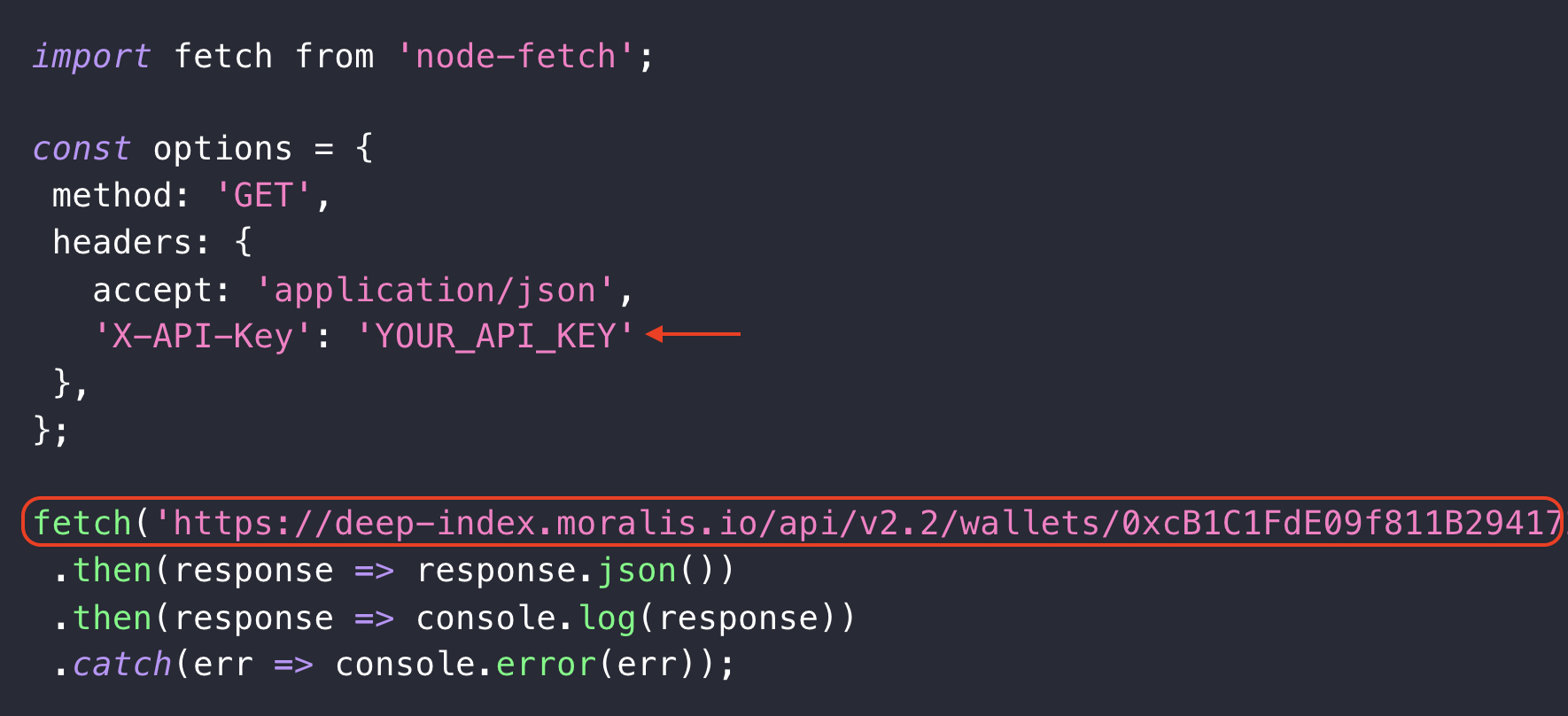
That’s it for the code; all that remains from here is running the script.
Step 3: Run the Code
Open a new terminal, cd into the root folder of your project, and run this command:
node index.js
In return, you’ll get a JSON response containing all the DeFi positions of the wallet in question. It will look something like this:
[
{
"protocol_name": "Uniswap v2",
"protocol_id": "uniswap-v2",
"protocol_url": "https://app.uniswap.org/pools/v2",
"protocol_logo": "https://cdn.moralis.io/defi/uniswap.png",
"position": {
"label": "liquidity",
"tokens": [
{
"token_type": "supplied",
"name": "USD Coin",
"symbol": "USDC",
"contract_address": "0xa0b86991c6218b36c1d19d4a2e9eb0ce3606eb48",
"decimals": "6",
"logo": "https://logo.moralis.io/0x1_0xa0b86991c6218b36c1d19d4a2e9eb0ce3606eb48_e6ec22e3ef954a7f9eda04f294938f4d",
"thumbnail": "https://logo.moralis.io/0x1_0xa0b86991c6218b36c1d19d4a2e9eb0ce3606eb48_e6ec22e3ef954a7f9eda04f294938f4d",
"balance": "10201154.21838458636254664856",
"balance_formatted": "10.20115421838458636254664856",
"usd_price": 1.0005100883196762,
"usd_value": 10.206357707998599
},
//...
],
"address": "0xb4e16d0168e52d35cacd2c6185b44281ec28c9dc",
"balance_usd": 20.39728835741469,
"total_unclaimed_usd_value": null,
"position_details": {
"reserve0": "10.20115421838458636254664856",
"reserve1": "0.00330867451530769526077552762624109457",
"factory": "0x5c69bee701ef814a2b6a3edd4b1652cb9cc5aa6f",
"pair": "0xb4e16d0168e52d35cacd2c6185b44281ec28c9dc",
"share_of_pool": 0.000020959018625703
}
}
},
//...
]
This response features a wealth of information for each position, including position labels, position details, unclaimed rewards, balances, token prices, logos, and much more.
That’s it! To learn more about our other endpoints and how they work, please visit the DeFi API documentation page!
Benefits and Use Cases for DeFi Positions
Now that you have an overview of how to retrieve the DeFi positions of any wallet, let’s delve into the use cases and benefits of this feature:
- Enhanced Portfolio Management: Wallet builders can provide users with a comprehensive view of all their assets, leading to superior portfolio management tools and increased user engagement.
- Accurate Tax Reporting: Tax companies can enhance the precision of their reports by incorporating DeFi position data, ensuring more accurate tax calculations.
- Informed Investment Decisions: Investment firms and analysts can make more informed decisions thanks to detailed position data, improving investment strategies and outcomes.
- Comprehensive Wallet Insight: Portfolio trackers can offer users better insight into their financial status, including assets locked in DeFi protocols and unclaimed rewards.
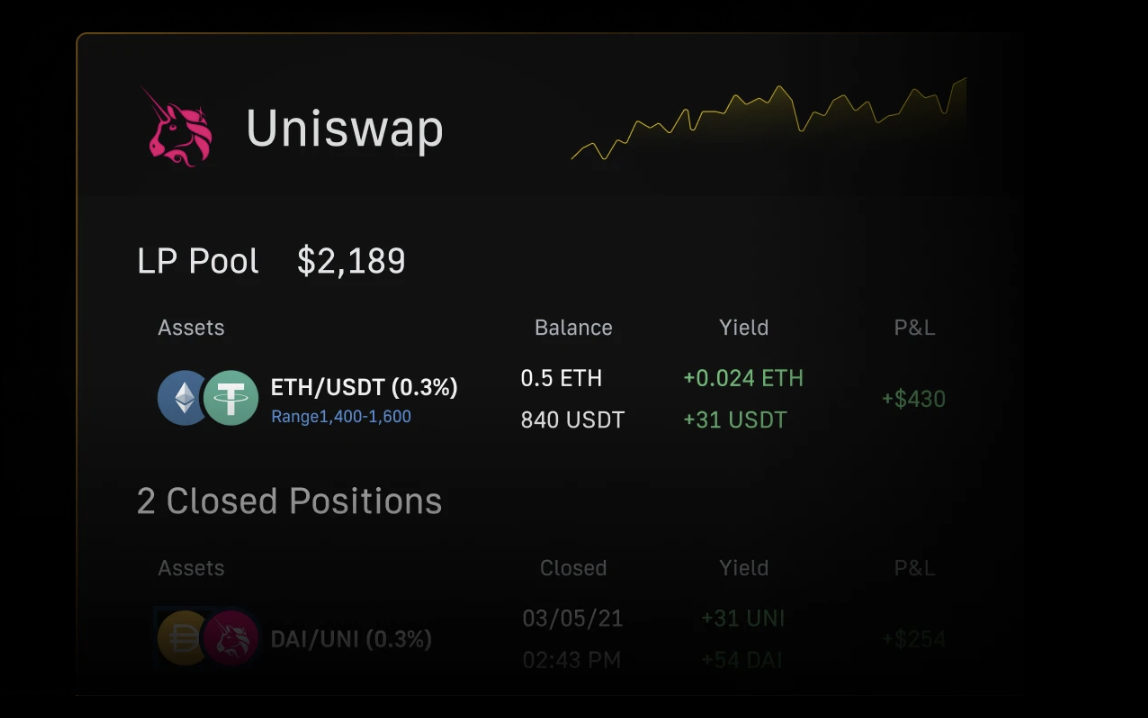
These are just a few of the significant use cases and benefits of Moralis’ DeFi positions feature. And this powerful tool is likely to prove valuable for most DeFi dapps!
Summary: DeBank API Alternative – Best Free DeFi API to Track DeFi Positions
If you’re searching for the best alternative to the DeBank API, look no further. Moralis offers a comprehensive suite of Web3 APIs, equipping you with the necessary tools to effortlessly integrate on-chain data into your dapps. We provide over ten specialized APIs, including the DeFi API, Wallet API, Token API, and many more. As such, when using Moralis, you can seamlessly build everything from DeFi platforms to Web3 wallets!
Why choose Moralis over the DeBank API?
Here’s a comparison to help you decide:

Moralis delivers the industry’s most detailed API responses, ensures enterprise-grade data security, and offers many other benefits—all for free. As such, when it comes to building dapps, Moralis is a clear choice!
Additionally, Moralis provides a premier node service, simplifying the complexities of running blockchain nodes. With our intuitive point-and-click interface, you can set up nodes for over 35 chains with ease.
Want to know more? Check out these articles:
Ready to start using our premier suite of APIs? Sign up with Moralis today. Creating an account is free, and you’ll have immediate access to our industry-leading development tools!




